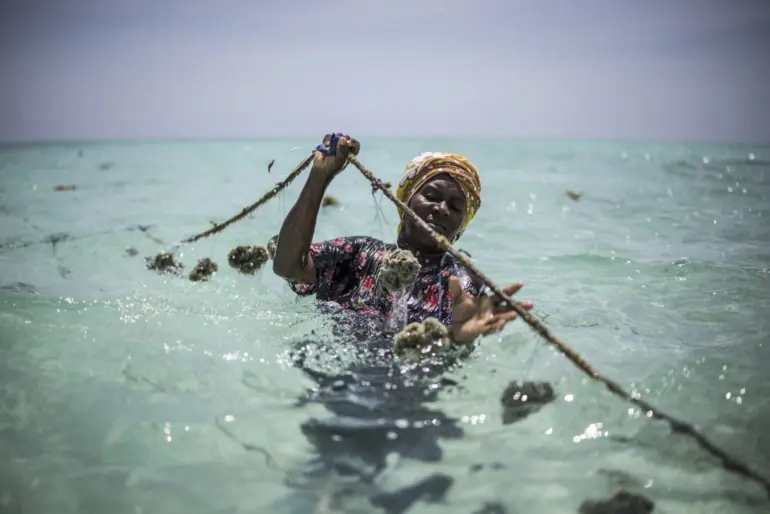Every morning around 10 am, women in hijabs and flowing dresses wade through Zanzibar’s turquoise shallow waters to tend their sponge farms, a lifeline after climate change disrupted their traditional livelihoods.
Rising ocean temperatures, overfishing, and pollution have steadily degraded marine ecosystems around the island, undermining seaweed farming, a key source of income for locals in Jambiani village.
Now, many have turned to sponge cultivation through a project initiated by Swiss NGO Marine Cultures.
“Hot temperatures killed the seaweed, and declining fish stocks forced many fishermen to quit,” said project manager Ali Mahmudi. “But sponges thrive in warmer waters.”
Sponges provide both environmental and economic benefits. They offer habitat and food for marine life and are in demand as organic personal care products for skin exfoliation. Depending on size, a sponge can fetch up to $30, and a single farm can hold as many as 1,500.
From the shore, black sticks jut from the water, holding lines of sponges.
“I was shocked to learn that sponges exist in the ocean,” said Nasiri Hassan Haji, 53, recalling her introduction to the practice over a decade ago. A mother of four, she once farmed seaweed, describing it as labor-intensive with meager returns.
In 2009, Marine Cultures launched a pilot sponge farm with widowed women in Jambiani. With over a quarter of Zanzibar’s 1.9 million population living below the poverty line, the project offered both a livelihood and a new skill set.
Demand for eco-friendly products has fueled growth. The US National Oceanic and Atmospheric Administration estimated the natural sponge market at $20 million in 2020.
“It has changed my life; I was able to build my own house,” said Shemsa Abbasi Suleiman, 53, smiling proudly.
Many women have since joined a cooperative to expand the initiative, though challenges remain. “At first, I was afraid because I could not swim. Many warned me that the water would be too much and I would die,” said Haji. With support from the NGO, she learned to swim at 39.
Sponges help restore coral reefs
Beyond income, sponges benefit the marine environment. Their skeletal structure aids carbon recycling, and their porous bodies filter and purify seawater. They also help restore coral reefs, which sustain 25% of marine life and are under threat.
According to the United Nations, an estimated 60% of the world’s marine ecosystems are degraded or used unsustainably, warning that the “ocean is in deep crisis.”
“What attracted me to this is the fact that we are not destroying the environment,” Haji said.
Members of Zanzibar’s Sponge Farmers’ Cooperative, a women-led organization, continue tending their farm off the coast of Jambiani, blending livelihoods with ecological stewardship.
AFP


